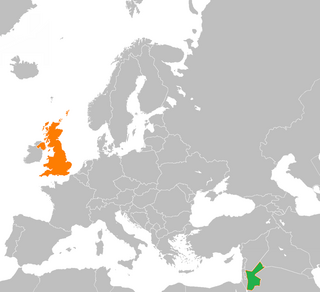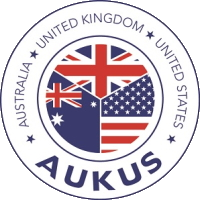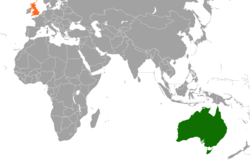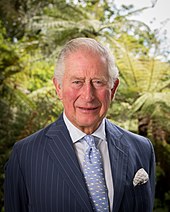
The Anglosphere is the Anglo-American sphere of influence, with a core group of nations that today maintain close political, diplomatic and military co-operation. While the nations included in different sources vary, the Anglosphere is usually not considered to include all countries where English is an official language, so it is not synonymous with the sphere of anglophones, though commonly included nations are those that were formerly part of the British Empire and retained the English language and English Common Law.

The Australia, New Zealand, United States Security Treaty is a 1951 non-binding collective security agreement initially formed as a trilateral agreement between Australia, New Zealand, and the United States; and from 1986 an agreement between New Zealand and Australia, and separately, Australia and the United States, to co-operate on military matters in the Pacific Ocean region, although today the treaty is taken to relate to conflicts worldwide. It provides that an armed attack on any of the three parties would be dangerous to the others, and that each should act to meet the common threat. It set up a committee of foreign ministers that can meet for consultation.

Since at least 1542, England and later Great Britain and Ireland have been connected politically, reaching a height in 1801 with the creation of the United Kingdom of Great Britain and Ireland. About five-sixths of the island of Ireland seceded from the United Kingdom in 1922 as the Irish Free State. Historically, relations between the two states have been influenced heavily by issues arising from their shared history, the independence of the Irish Free State and the governance of Northern Ireland. These include the partition of Ireland and the terms of Ireland's secession, its constitutional relationship with and obligations to the UK after independence, and the outbreak of political violence in Northern Ireland. Additionally, the high level of trade between the two states, their proximate geographic location, their common status as islands in the European Union until Britain's departure, common language and close cultural and personal links mean political developments in both states often closely follow each other.

Australia and the United States are close allies, maintaining a robust relationship underpinned by shared democratic values, common interests, and cultural affinities. Economic, academic, and people-to-people ties are vibrant and strong. At the governmental level, relations between Australia and the United States are formalized by the ANZUS security agreement, the AUKUS security partnership and the Australia–United States Free Trade Agreement. They were formally allied together in both World War I, World War II, the Korean War, the Vietnam War, the Gulf War, and the War on Terror, although they had disagreements at the Paris Peace Conference. Australia is a major non-NATO ally of the United States.

Consular relations between China and Australia were first established in 1909, and diplomatic relations were established in 1941. Australia continued to recognise the Republic of China (ROC) government after it lost the Chinese Civil War and retreated to Taiwan in 1949, but switched recognition to the People's Republic of China (PRC) on 21 December 1972. Chinese Australians have been a significant minority group in the country since the Qing dynasty.

Relations between Ukraine and the United Kingdom have existed in one form or another since Ukrainian independence in 1991. The two countries have ties across political, military, social and economic spheres. The UK hosts up to 200,000 Ukrainian refugees giving it the sixth largest Ukrainian migrant population in Europe.

New Zealand–United Kingdom relations are the bilateral relations between New Zealand and the United Kingdom. New Zealand has maintained a close relationship with Britain, since gaining independence from the United Kingdom.

India–United Kingdom relations, also known as Indian–British relations or Indo–British relations, are the international relations between the Republic of India and the United Kingdom of Great Britain and Northern Ireland. India has a high commission in London and two consulates-general in Birmingham and Edinburgh. The United Kingdom has a high commission in New Delhi and six deputy high commissions in Mumbai, Ahmedabad, Chennai, Bangalore, Hyderabad and Kolkata. Both countries are full members of the Commonwealth of Nations.

Malaysia–United Kingdom relations are bilateral foreign relations between Malaysia and the United Kingdom. Malaysia has a high commission in London, and the United Kingdom has a high commission in Kuala Lumpur. Both countries are full members of the Commonwealth of Nations.

The relationship between the Republic of Korea and the United Kingdom of Great Britain and Northern Ireland spans from the 19th century to the present day. Although the Republic of Korea gives 18 January 1949 as the date of the establishment of formal relations with the United Kingdom, diplomatic ties go back to the United Kingdom–Korea Treaty of 1883. British military participation in the Korean War during the 1950s was significant, but relations between the two countries at the time were described as "tenuous", with relatively little known about each other. Commercial and trade relationships grew rapidly during the 1970s. During the Asian Financial Crisis in the late 1990s, Queen Elizabeth II made a state visit to South Korea, which was well received at a time of crisis in the country. Today, there are strong economic and diplomatic links between the two countries.

South Africa–United Kingdom relations are the current and historical relationships between the United Kingdom (UK) and the Republic of South Africa. South Africa is the most important trade partner in Africa for the United Kingdom and an important partner for the UK in a number of areas.
Commonwealth free trade is the process or proposal of removing barriers of trade between member states of the Commonwealth of Nations. The preferential trade regime within the British Empire continued in some form amongst Commonwealth nations under the Imperial Preference system, until that system was dismantled after World War II due to changes in geopolitics and the pattern of global trade, and the United Kingdom's entry into the European Economic Community. The idea of promoting renewed inter-Commonwealth trade emerged in the late 20th century as a response to the evolution of the global economy. At one extreme, proposals have been raised for the creation of a multilateral free trade area comprising all member states of the Commonwealth of Nations.

Kenya–United Kingdom relations are bilateral relations between Kenya and the United Kingdom. The interactions between the two states have been positive and friendly since Kenya's independence in 1963. Both the UK and Kenya are members of the Commonwealth of Nations and engage with each other regularly on matters of military, economic and cultural importance. Kenya retains many aspects of British culture and governance, such as continuing to use English within administration, education and the law, driving on the left, hosting a diaspora community of Britons, and having a large Protestant population. The British military continues to play an important role in the country with Kenya hosting the UK's largest base in Africa, which provides vital anti-terrorism training to the Kenyan police. The British royal family, in particular Elizabeth II had very close personal ties to the country. Elizabeth II was in Kenya when she received news that her father King George VI had died, and had made multiple state visits throughout her reign. To mark the 2022 Platinum Jubilee, Prince Edward visited the country to reinforce ties and celebrate Kenya's historic and current relationship with the UK. British tourism and finance are significant contributors to the Kenyan economy, with 100,000 British people visiting the country ever year for its national parks and wildlife.

CANZUK is an acronym for a proposed alliance comprising Canada, Australia, New Zealand and the United Kingdom as part of an international organisation or confederation similar in scope to the former European Economic Community. This includes increased trade, foreign policy co-operation, military co-operation and mobility of citizens between the four states, tied together by similar economic systems, social values and political and legal systems, in addition to the majority population of each country speaking English. The idea is lobbied by the advocacy group CANZUK International and supported primarily by conservatives. Other supporters include think tanks such as the Adam Smith Institute, the Henry Jackson Society, Bruges Group and politicians from the four countries.

The Comprehensive and Progressive Agreement for Trans-Pacific Partnership (CPTPP), also known as TPP11 or TPP-11, is a trade agreement between Australia, Brunei, Canada, Chile, Japan, Malaysia, Mexico, New Zealand, Peru, Singapore, and Vietnam. It evolved from the Trans-Pacific Partnership (TPP), which was never ratified due to the withdrawal of the United States. The eleven members have combined economies representing 13.4 percent of global gross domestic product, at approximately US$13.5 trillion, making the CPTPP one of the world's largest free-trade areas by GDP, along with the United States–Mexico–Canada Agreement, the European single market, and the Regional Comprehensive Economic Partnership. The United Kingdom and the present members formally signed an accession protocol on 16 July 2023 and will join the agreement when it has been ratified by all parties, or after 15 months if the UK and a majority of CPTPP parties have ratified it.

Jordan–United Kingdom relations, or Anglo-Jordanian relations, refers to the relationship between the Hashemite Kingdom of Jordan and the United Kingdom of Great Britain and Northern Ireland. Both countries share a relatively close relationship because of the Hashemites, who received British help to overthrow Ottoman rule in the country during World War I.

Following its withdrawal from the European Union on 31 January 2020, the United Kingdom began negotiations on several free trade agreements to remove or reduce tariff and non-tariff barriers to trade, both to establish new agreements and to replace previous EU trade agreements. Withdrawal ended 47 years of membership during which all its trading agreements were negotiated by the European Commission on behalf of the bloc. The UK did not actually withdraw from the European Single Market and the European Union Customs Union until 31 December 2020.

The Australia–United Kingdom free trade agreement (AUKFTA) was signed 17 December 2021. The broad terms of the agreement had been agreed six months earlier, following almost a year of negotiations. It was the first trade agreement signed by Britain since leaving the European Union that was negotiated completely anew.

AUKUS, also styled as Aukus, is a trilateral security partnership for the Indo-Pacific region between Australia, the United Kingdom, and the United States. Announced on 15 September 2021, the partnership involves the US and the UK assisting Australia in acquiring nuclear-powered submarines. The partnership also includes cooperation on advanced cyber mechanisms, artificial intelligence and autonomy, quantum technologies, undersea capabilities, hypersonic and counter-hypersonic, electronic warfare, innovation and information sharing. The partnership will focus on military capability, distinguishing it from the Five Eyes intelligence-sharing alliance that also includes New Zealand and Canada.



























